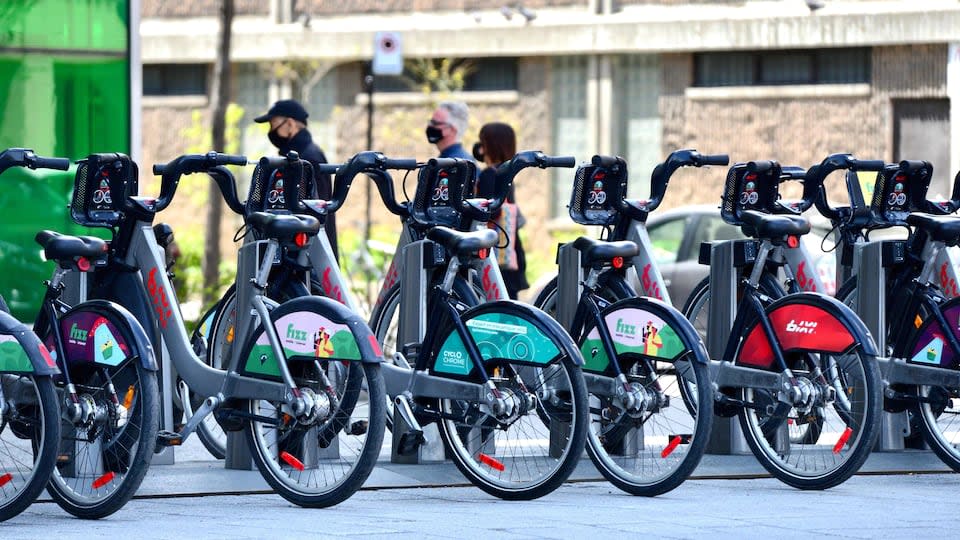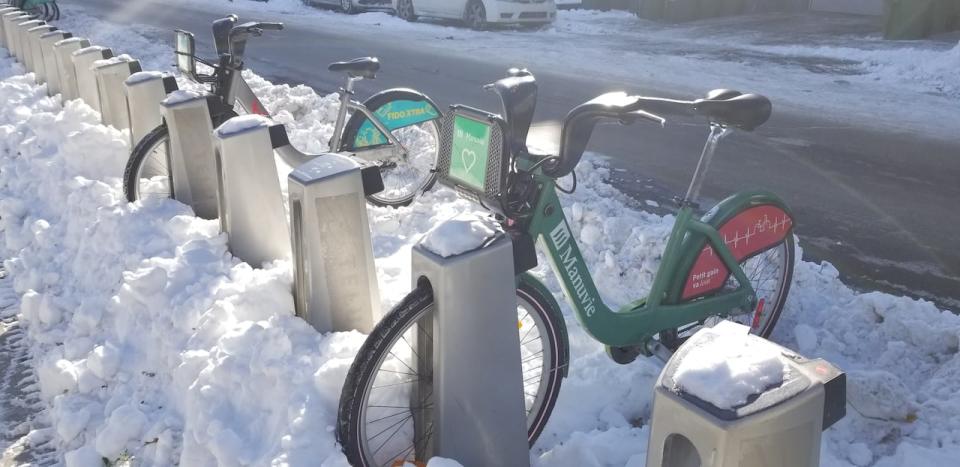Buckle that helmet. Bixi biking season starting early this year

Bixi bike users in Montreal are getting a head start to the cycling season, the earliest in the non-profit's 16-year history.
Bixi Montréal announced Tuesday that over half of its network is available to users starting today, with that number shooting up to 85 per cent next week. The system is expected to be fully operational by April 15, the date that usually marks the start of the cycling season.
"More than one in four Montrealers use Bixi," said Sylvia Morin, Bixi Montréal's interim president, adding that 2023 saw 576,000 users, up 31 per cent from 2022 and a 55 per cent jump from 2021.
Sophie Mauzerolle, the executive committee member in charge of mobility and transportation at the city of Montreal, said that more and more Montrealers are using the service, rain or shine, in part thanks to the city's biking infrastructure making the mode of transport easier and safer.
Mauzerolle said the city will be investing in an additional 1,300 self-serve bikes and 32 stations in Montreal.
Bixi says that cyclists using the service in Quebec will have more than 11,000 bikes to choose from in 2024 — including several thousand electric bikes — at some 930 stations across eight different cities in the province.

Bixi says the pilot project shows its bikes can withstand the ice and snow of Montreal winters. (Kristy Rich/CBC)
Cycling through ice and snow
This winter, Bixi also undertook a pilot project to test the bikes' resilience to Montreal's winter conditions and gauge rider demand.
Over 150 Bixi stations ran throughout the winter in parts of the city, and Mauzerolle said the results show that Bixi users want year-round service.
"Montrealers are ready for winter biking," she said.
The city announced it is renewing the pilot project next year, so cyclists will once again be able to pedal through the snowy streets of Montreal in 2025.
Bixi Montréal's general manager, Christian Vermette, said the pilot project results surpassed initial expectations, with 53,000 people using the service between November 16 and March 17.
"We doubled the estimate that we projected," he said.
Vermette said he was pleasantly surprised by how the bikes fared in wintry conditions.
"Our numbers for bikes that were coming back for repairs are way under what we were expecting. So far there's no problem," he said, but added that more in-depth analysis will made made at a later point once the data is compiled.
Despite the pilot project taking place during a milder winter season, he said that the Bixi network was created to withstand the wear and tear of colder weather — salt, slush, snow and all.
"The [Bixi] system was designed to operate in extreme conditions, heat or cold. We can go as low as –40."
According to a Bixi-led survey, nearly a quarter of members were retained through the winter, and 65 per cent of users — members and non-members — said the pilot project was their first winter biking experience.
REV paths expanding
Montreal says it will also continue to develop and expand the Réseau Express Vélo (REV), a network of high-capacity bike lanes around the city.
From the Sud-Ouest borough to Parc-Extension, Mauzerolle said the city is working to connect the boroughs on the island.
This year, the city will spend $30 million to develop more than 33 kilometres of REV road.

 Yahoo News
Yahoo News 
